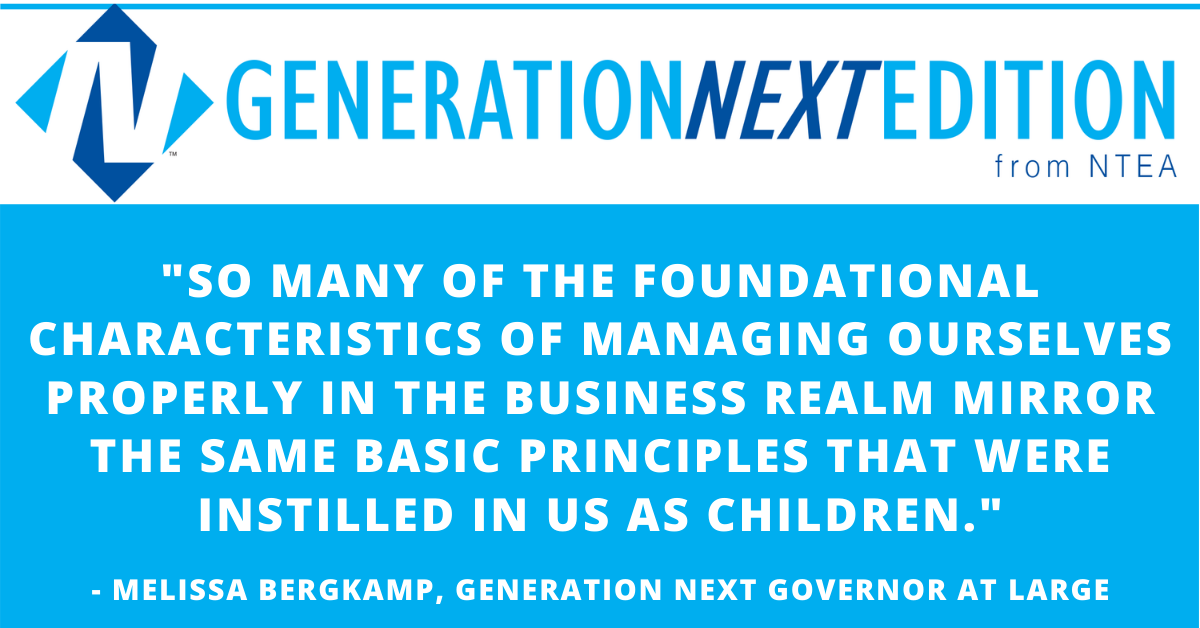
 By Melissa Bergkamp, Generation Next
By Melissa Bergkamp, Generation Next
Governor at Large, Harper Industries Inc./DewEze Mfg
This article was originally published in the November 2020 edition of Generation Next Edition.
There are few events in my lifetime that stack up against the uncertainty and controversy our nation has experienced in 2020. If you feel similar, you likely find yourself asking questions such as: what do I believe, who do I trust, and how do we proceed?
So many of the foundational characteristics of managing ourselves properly in the business realm mirror the same basic principles that were instilled in us as children. If this is true, and we encompass so many of these fundamentals from our childhood, how did we get here? More importantly, how do we get past “here” and move forward?
While it might seem like no simple task, establishing trust shouldn’t be all that difficult. Think about it this way - if the basis of forming trust was thrust upon us as children, we should all be well-practiced through decades of demonstration of these inherent behaviors. In fact, if we exercised these traits regularly, we should already have a “trust” fund established with others.
If all of this is true, navigating these polarizing times, even transitioning into a virtual environment, it wouldn’t be all that challenging to earn and retain trust.
Aside from a virtual workspace, it is always important for us to recognize how critical our delivery of information is. We cannot necessarily control how one perceives information that is exchanged, but we can control how the information is delivered. When you already have a preestablished relationship built on trust, you are inevitably given more grace. In contrast, when starting from scratch we must be aware of our boundaries and keep these simple tendencies at the forefront.
Honesty in all that we say, display, and do
Honesty isn’t just speaking the truth. Displaying honesty through our actions is equally important. Aligning what we say we are going to do with what we actually do and offering transparency along the way are the most obvious aspects to establishing trust.
In a business environment, rely on facts to support your information, explain your situation, and identify your decision. Explain why you came to this conclusion and how you got here. In antagonistic situations, stick to the facts to eliminate defensiveness and bias. Deliver the details that truly matter and be candid. The greatest opportunity for others to “fill in the gaps” comes when we are least transparent.
Kill them with kindness
The most straightforward way to earn one’s trust is to say nothing but hear everything. Practice active listening and show kindness to others through your engagement. Enter each exchange with an open mind and a clear conscious, ensuring all parties sense that they are in a safe and trusted space. I want to reiterate and expand on kindness. It is not to be confused with nice. Kindness does not imply one is pleasing or agreeable, however, it does equate to respect, selflessness, and geniality.
Deadlines that mean something
Dependability is a key steppingstone to paving the way to a trustworthy relationship. We prove reliability by honoring our commitments and providing follow through -- consistent follow through. When you can control a deadline, provide yourself ample time for achievement. And when you can’t, offer advanced communication explaining your concerns so surprises are minimized.
This sense of responsibility and reliability not only builds trust, but exhibits admirable traits such as integrity, tenacity, and loyalty.
Accept responsibility, take the blame and move on
So often we as humans feel as though we cannot proceed until we have pointed the finger and assigned responsibility to someone for mistakes or even inconclusive situations. But why? Why do we have such a difficult time accepting ownership? If we have a history of accuracy and trust built up with our colleagues, friends, etc., why are we so hesitant to take ownership when we occasionally fail? And how are others so willing to take ownership of mistakes that aren’t even theirs?
I believe wholeheartedly, those that are willing to take the blame - even when it is not theirs to take - feel comfortable and confident in their surroundings. One whom self-sacrifices is subconsciously telling others, “I trust all of you to the extent that I know if I personally take responsibility for recent events, it will allow the group to proceed and I will not be judged for the mistake moving forward.” One whom self-sacrifices is so aware of their “trust” fund level with their peers, they know it will have little to no impact on how they are perceived by the group.
Keep in mind, self-sacrifice is not intended to portray those who employ this behavior as a martyr. Taking ownership of actions, yours or others, good or bad, reaffirms qualities such as humility, mindfulness, and even empathy when used appropriately.
- - - - - - - - - - - - - - - - - - - - - - - - - - - - - - - - - - - - - - - - - - - - - - - - - - - - - - - - - - - - - - - - - - - - -
Now, take a moment to reflect back on a childhood experience which required you to hone in on these basic fundamentals… It is likely honesty, kindness, commitment, and responsibility were all present. If one or more of these behaviors were lacking, I presume the topics were consistently reiterated to reinforce the importance. The act of reinforcement throughout our youth alone echoes the significance these traits have on our society.
Fast forward to today. If each of us would strive to embody our “inner child,” and remain committed to displaying these characteristics, how much trust would we have in our own fund? How quickly would be able to navigate uncertain times if trust was earned and cohesion was the guaranteed result?
